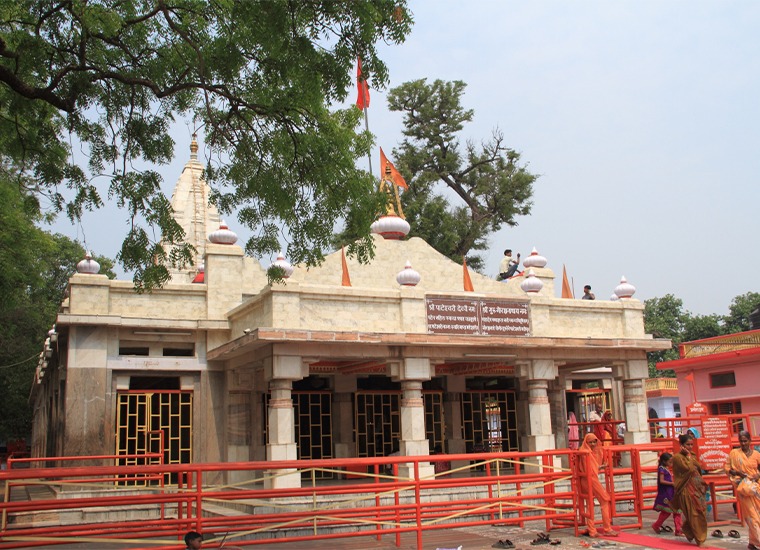Bahraich farmers cultivate a wide variety of organic and sustainably grown crops, like Basmati, Non-Basmati, Maize, Wheat, Mustard, Lentil, Pigeon Pea, Mustard, and more, which are then fine-graded and quality-tested before being distributed.


Nature Bio Foods’ Bahraich Project is located in the Bahraich district in the state of Uttar Pradesh, India. It is located on the Saryu River, a tributary of the Ghaghara river. Bahraich is not industrially developed and most of the industries in this region are based on agricultural and forest products. The Krishi Vigyan Kendra, Bahraich is a district level Farm Science Center established supports speedy transfer of technology on the farmers fields.
The region is known for its agriculture, with crops such as basmati, non-basmati, wheat, and sugarcane being grown in abundance. Animal husbandry is also a significant economic activity, with buffalo and cattle rearing being common. The people of Bahraich are known for their hospitality and warm nature. They are deeply rooted in their culture and traditions and celebrate various festivals with great enthusiasm.
NBF’s Project Bahraich
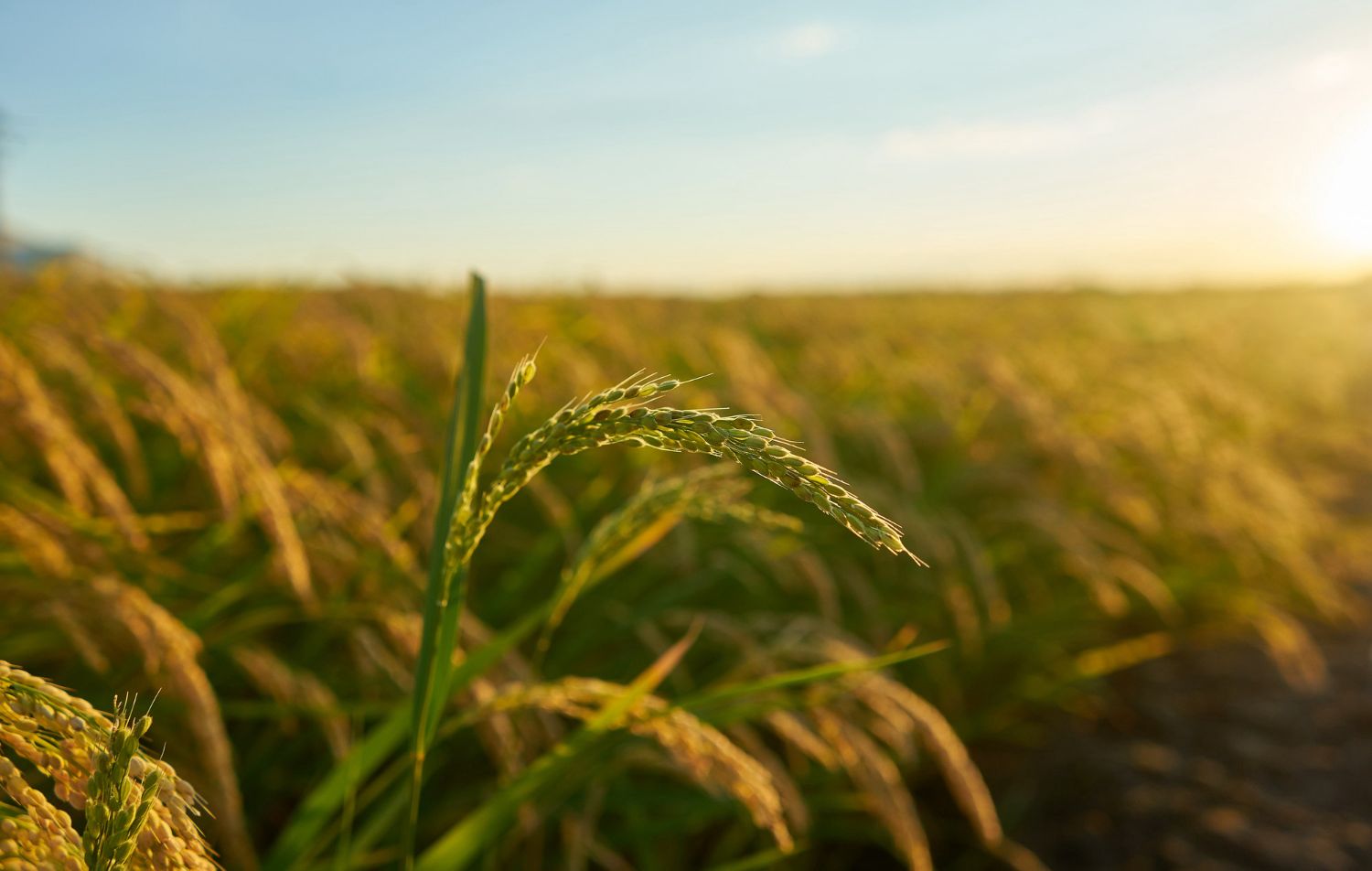

Location of the Project
NBF Bahraich project is a city located in the northern Indian state of Uttar Pradesh, close to the border with Nepal. It is situated on the banks of the Ghaghara River, which is a tributary of the Ganges. It is the administrative headquarters of Bahraich district, which is known for its rich history and cultural heritage. Bahraich is located approximately 130 kilometers (80 miles) northeast of Lucknow, the state capital of Uttar Pradesh, and approximately 200 kilometers (124 miles) east of Nepal’s capital, Kathmandu.
Coordinates: NBF’s project lies between 280.24’ and 270.4’ N latitude and 810 65’ to 810 3’ eastern longitudes.

Organic Certification
Demeter Certified Bahraich Project

BIODYNAMICS –
STARTING FROM THE GROUND UP
KEEPING UP
HIGH STANDARDS
Nature Bio Foods has embraced Demeter biodynamic farming practices in its Bahraich project, securing the prestigious Demeter International certification. This recognition signifies Nature Bio Foods’ commitment to upholding the utmost standards in biodynamic agriculture. The project has received Demeter International certification, which recognizes the highest standards of biodynamic agriculture.
The project in Bahraich involves working closely with local farmers to promote biodynamic farming practices. Nature Bio Foods provides training and technical support to farmers, as well as access to organic and biodynamic seeds and other inputs, to help them transition to biodynamic farming. The Demeter International certification to NBF ensures that our products are produced according to the highest standards of biodynamic agriculture. The implementation of Demeter biodynamic farming practices in the project in Bahraich reflects Nature Bio Foods’ commitment to promoting sustainable agriculture and supporting local communities.
Bahraich Project Certified by BioSuisse Organic and Naturland

Nature Bio Foods’ Bahraich project has been crucial in promoting sustainable agriculture and supporting local communities in Bahraich. The development of organic farming infrastructure, such as composting units and vermicomposting pits, has helped farmers improve soil health and fertility. The Bio Suisse certification of NBF’s project is an internationally recognized certification that is awarded to products that meet stringent organic farming standards. It is a testament to the commitment of the project in Bahraich to sustainable agriculture and organic farming practices. By promoting organic farming practices, the project has helped to create a more sustainable future for the region and its people, while providing global consumers with access to high-quality, organic products.

Nature Bio Foods’ Bahraich project proudly holds Naturland certification, strengthening the commitment to organic agriculture and fostering the prosperity of smallholder farmers. Naturland certification is attainable even for low-acreage farmers, and they work with producer associations that incorporate numerous individual producers. By working with Naturland, NBF is enabling smallholder farmers to adopt sustainable and organic farming practices while gaining access to premium markets for their produce. NBF’s partnership with Naturland not only benefits the environment but also supports the livelihoods of smallholder farmers. By promoting sustainable and organic agriculture, NBF is helping to increase the income and resilience of farmers from Bahraich region, while also contributing to global efforts towards a more sustainable food system.
Social Certification

Fairtrade Certified Bahraich Project
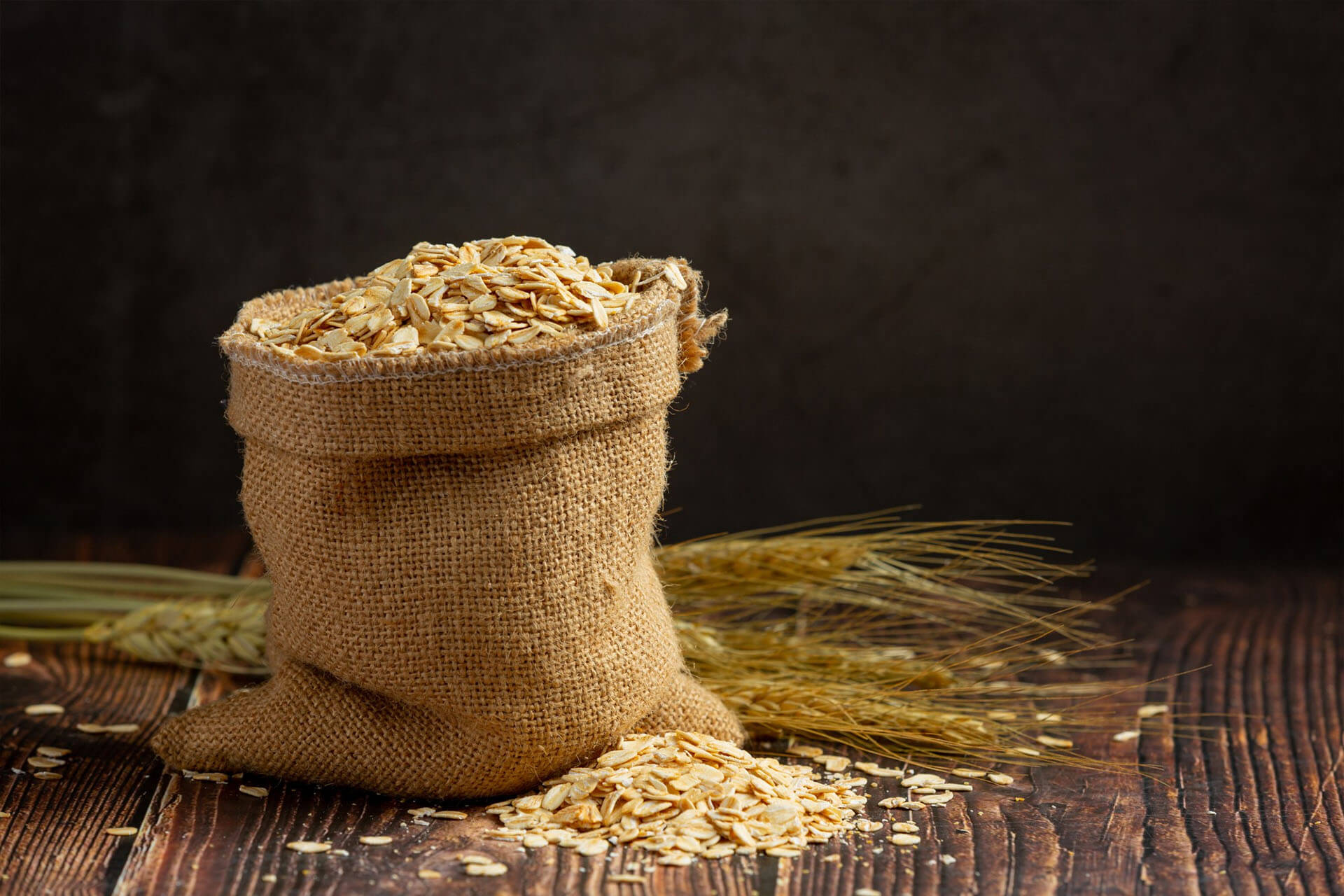
Nature Bio Foods’ Bahraich project is Fairtrade certified allowing workers and farmers to earn fairer prices for their organic crops, and have control over their futures. Our Bahraich project aligns with Fairtrade’s approach to empowering farmers and workers to have greater control over their lives and invest in their future. We fully support Fairtrade’s standards and associated norms, and we’re proud to integrate them into our business practices.
When you see the FAIRTRADE Mark on our products, you can trust that we’ve met internationally agreed-upon standards that have been independently verified. At NBF, we prioritize fairness and ethical practices in all aspects of our business, and our commitment to Fairtrade is an essential part of that.
We believe in empowering farmers and workers at NBF, which is why they have a strong voice at every level of trade. From managing their farms to contributing to our discussion forums, we’re dedicated to providing an equal platform for everyone. Our adherence to Fairtrade’s principles is not just about compliance; it’s a core value that guides our business.
Fairtrade is more than just a certification at NBF; it’s a way of doing business that puts people first. We’ve followed Fairtrade practices and implemented measures that provide better prices and working conditions for farmers and workers. By doing so, we’re helping to create a fairer deal for those who work hard to produce our products.
Welfare Activities under Fairtrade in NBF Bahraich Project
Welfare Activities under Fairtrade in NBF Bahraich Project: The NBF Bahraich Project is dedicated to promoting welfare activities under the Fairtrade initiative.. In the Bahraich Project, various welfare activities are carried out to improve the livelihoods of the local communities. These activities encompass a wide range of initiatives, including education, sustainable energy, agriculture, and safety.

Illuminating Streets
Nature Bio Foods in NBF Bahraich Project took the initiative to illuminate the streets by installing 300 solar street lights. These lights not only brightened up the neighborhoods but also helped in reducing the dependence on conventional electricity sources, leading to a greener and sustainable approach to street lighting.

Fostering Educational Partnerships
As a part of their commitment to education, Nature Bio Foods collaborated with schools through their School Adoption Programme. In the Bahraich Project, they adopted a total of 5 schools, impacting the lives of 1899 students. To enhance the learning experience, they established computer classrooms in each of these schools, installing a total of 25 computers with 5 inverters and 10 batteries. Moreover, they provided essential support in the form of furniture and stationary, including 168 desk and bench sets, 25 computer tables, and 75 stools. Additionally, they appointed 5 computer teachers to ensure effective utilization of these resources.

Land Laser Levelling
With a progressive agricultural approach, Nature Bio Foods covered 4200 acres of land using land laser levelling techniques. This innovative method allowed for precise and efficient land preparation, resulting in significant benefits. The project led to a substantial increase of 1890 million liters of groundwater, contributing to better water availability for crops. The time required for irrigation of rice crops was reduced to 91 hours per hectare per season, leading to water conservation and improved farming practices. The implementation of land laser levelling also resulted in a reduction of electricity consumption by 991 kWh per hectare per year, effectively saving energy and lowering CO2 emissions by 275,625 kilograms.

Exposure Visit and Training Programme for Students
Nature Bio Foods organized exposure visits and training programs for students to provide them with practical knowledge and experience beyond the classroom. These visits and programs aimed to broaden their understanding of various industries, agriculture, and environmental practices, equipping them with valuable skills for their personal and professional growth.
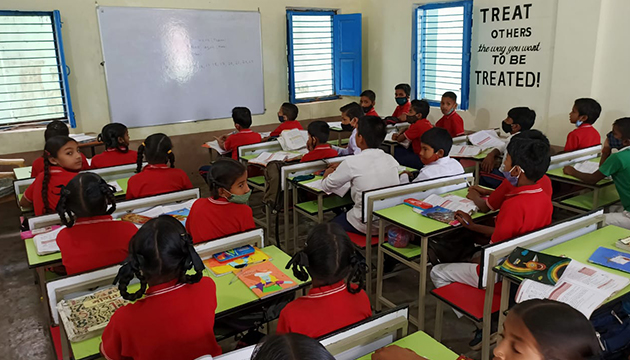
Distribution of Essential Equipment
As a part of their outreach efforts, Nature Bio Foods distributed essential equipment to the community. This included the distribution of over 4000 spray pumps, torches, LED bulbs, and fans. These items not only contributed to the convenience and well-being of the recipients but also promoted sustainable practices and energy conservation.

Environment Initiatives
Nature Bio Foods took significant steps towards environmental conservation by implementing the construction of 425 biogas units and 2 ponds. These biogas units offered a sustainable solution for energy generation, while the ponds provided multiple environmental benefits, such as water storage, biodiversity support, and overall ecosystem improvement. Additionally, the company initiated tree plantation drives to combat deforestation and promote a greener environment.

Farmer Knowledge Centre
Recognizing the importance of knowledge dissemination in agriculture, Nature Bio Foods established Farmer Knowledge Centres. These centers served as hubs for agricultural education and provided farmers with access to valuable information, best practices, and modern techniques to enhance crop productivity and sustainable farming methods.

Clean Drinking Water Filters
As a part of their community welfare efforts, Nature Bio Foods distributed clean drinking water filters to the beneficiaries. These filters ensured access to safe and potable drinking water, positively impacting the health and well-being of the communities they served.

Menstrual Hygiene Project
Nature Bio Foods undertook a Menstrual Hygiene Project, aiming to support women and girls in managing their menstrual health with dignity. Through this project, they distributed over 50,000 sanitary pads, benefiting more than 4926 girls and women. By providing access to menstrual hygiene products, they contributed to the empowerment and well-being of women and girls in the region.
Everything you need to know about Bahraich
The region is situated on the Indo-Gangetic plain, which is known for its alluvial soils, and has a hot and humid climate with a monsoon season from June to September. Bahraich has about 7% of its area under forests. The topography of the Bahraich district is almost flat, with a gentle slope towards the south. The district has a number of small and marginal farmers who cultivate small plots of land, and the majority of the agricultural activities are still rain-fed.
Despite the challenges faced by farmers in the region, such as pests and diseases, the agricultural output in Bahraich has been steadily increasing in recent years. This is due in part to the fertile soils and favorable climate, as well as the efforts of organizations such as Nature Bio Foods to promote sustainable and organic farming practices.
Agricultural Characteristics
Soil Profile

The soils of Nature Bio Foods’ project in Bahraich can be broadly classified into two types – “Matiyar” or clay, and “Dumat” or loam. The hard clay soil or Matiyar is particularly well-suited for rice cultivation and is highly fertile. The Dumat or loam soil is also fertile and ideal for growing a variety of crops, which contributes to high crop yields in the district.
By working closely with local farmers and promoting sustainable farming practices, Nature Bio Foods’ project in Bahraich is helping to ensure the continued productivity and fertility of the region’s soils, while supporting local communities and promoting organic and biodynamic agriculture.

Matiyar or Clay Soil: Matiyar or clay soil found in Nature Bio Foods’ Bahraich project is excellent for rice cultivation due to its high fertility. Its compact nature provides a favorable environment for root development and nutrient retention.

Dumat or Loam Soil: Dumat or loam soil in the project area is also fertile and versatile, making it suitable for a wide range of crops. This well-balanced soil type contributes to high crop yields, allowing for diverse agricultural production and sustainable farming practices in the district.
Climate Condition
Bahraich experiences a warm humid subtropical climate, with cool and dry winters that typically last from December to February. Summers are dry and hot, lasting from April to June. The monsoon season typically begins in mid-June and lasts until mid-September, bringing an average annual rainfall of 1124 mm to the district.
The average temperature during the winter season is around 22.6°C, making it a pleasant time of year to visit the region. August is the most humid month, with an average humidity level of 80%. The months of March to May are generally dry, making them suitable for outdoor activities and exploration. Overall, the climate in Bahraich provides a conducive environment for agriculture and a comfortable living experience for its residents.
Temp.
Minimum

7 °C
(Dec-Jan)
Maximum

47 °C
(May-June)
Humidity
Relative Humidity

80%
Rainfall
When compared with winter, the summers have much more rainfall.
Average Rainfall

900-1200 mm
Seasons
There are mainly three seasons.

Summer
(Mar-June)

Rainy
(July-Sep)

Winter
(Oct-Feb)
Farm Water Availability
Bahraich region has several sources of water that contribute to its agricultural productivity. The major part of land water in Bahraich is received from ever-flowing rivers such as Saryu, Rapti, Ghaghra, and Kaudiyala. In addition, there are various lakes and ponds in the region that also contribute to the land water availability.
Groundwater is another significant source of water in Bahraich. The district has a high level of groundwater availability, with water typically found at a depth of 60 to 70 feet. This makes water readily available for both agricultural and industrial purposes through the use of tubewells and pumpsets. Overall, the abundant supply of water in Bahraich supports the region’s thriving agricultural sector.
Nature of Farmers
The farmers in Bahraich are hardworking and dedicated individuals who have a deep connection to the land and its agricultural traditions. Agriculture is a primary source of livelihood for a significant portion of the population in Bahraich, and many farmers have been practicing agriculture for generations. They possess a wealth of knowledge about crop cultivation, irrigation techniques, and traditional farming practices.
Despite facing various challenges such as low crop yields, lack of modern technology, and inadequate infrastructure, the farmers in Bahraich remain resilient and committed to their agricultural pursuits. They often work long hours, often under harsh weather conditions, to ensure that their crops are healthy and productive. The farming community in Bahraich is known for their perseverance, strong work ethic, and community spirit, making them an integral part of the region’s cultural identity.

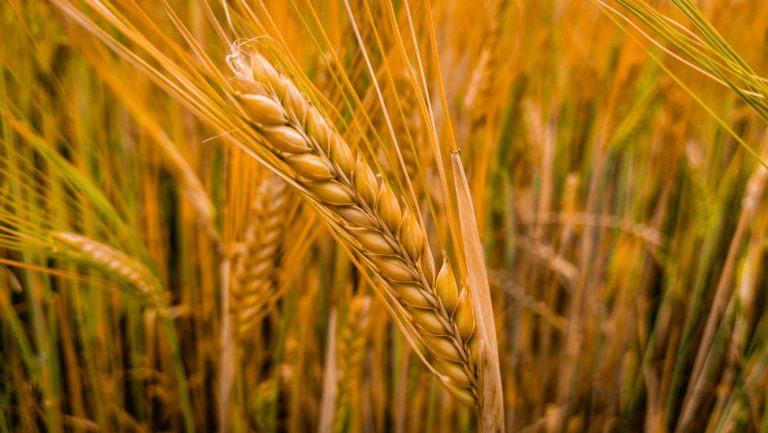

Growing Conditions
Bahraich is known for its fertile alluvial soils and warm humid subtropical climate that provide favorable growing conditions for various crops. The rice-wheat cropping system is the most predominant in the region. Rice, maize, pigeon pea, and moong bean crops are common during the Kharif season, while wheat, lentil, Bengal gram, pea, sesame, and groundnut are grown in the post-rainy (Rabi) season. The average rice yields in the region range between 2600-2900 kg/ha, and that of wheat ranges between 2800-2950 kg/ha. The use of residual soil moisture with one or two supplemental irrigation supports the growth of crops in the region, making it a crucial contributor to the region’s agricultural economy.
Crop Details
The region’s fertile soil is ideal for the cultivation of crops such as rice, wheat, sugarcane, and pulses. The abundant supply of water from rivers, lakes, and groundwater sources also supports the region’s thriving agricultural sector.
Kharif
Season farmers grow Non-Basmati Paddy, Basmati paddy, Maize, Sesamum.
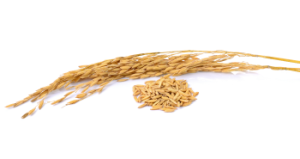
Rabi
The main cultivated crop is Wheat, Mustard, Lentil, Coriander, Flaxseed, Maize.
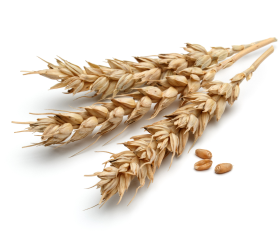
Statistics
NBF Supply Chain

NBF Supply Chain
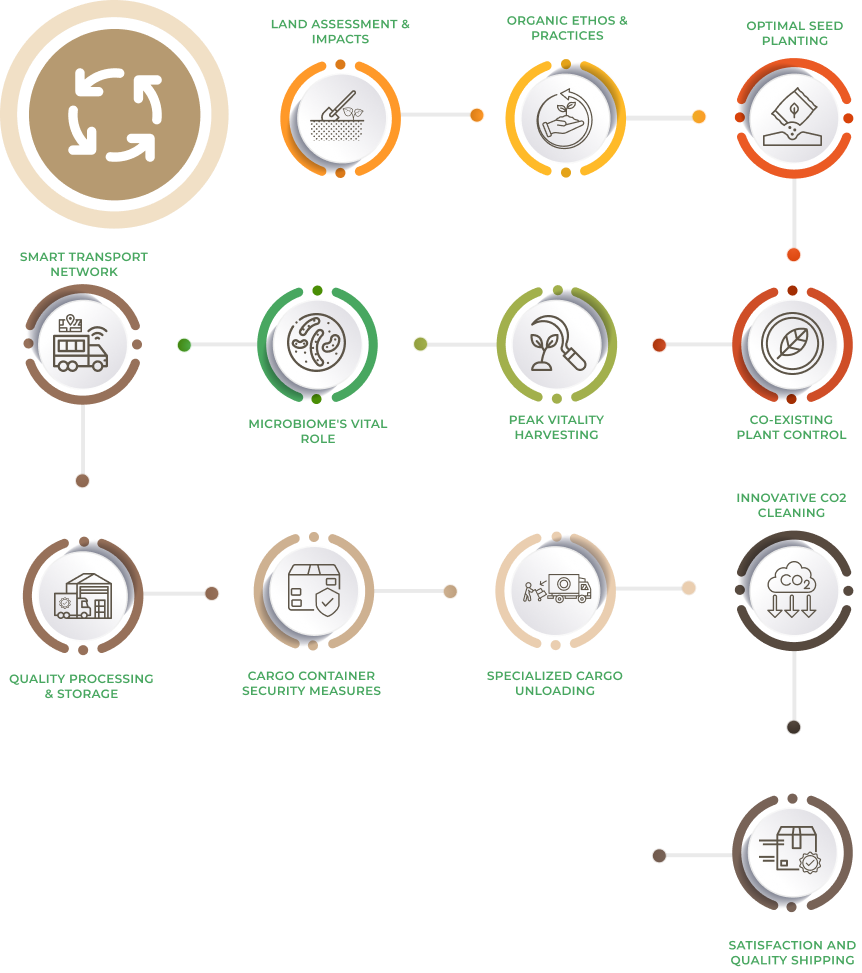
How to Reach Bahraich, Uttar Pradesh?
Bahraich is well-connected by road, rail, and air. Traveling to Bahraich is quite easy and convenient as it is well-connected to major cities by road, rail, and air.

By Train
Bahraich has its own railway station which is well-connected to major cities like Lucknow, Delhi, Mumbai, Kolkata, and Varanasi. Many express and superfast trains halt at Bahraich station, making it an easy and convenient mode of transport.

By Road
Bahraich is situated on the national highway NH-28, which connects Lucknow to Barauni in Bihar. Several buses and taxis operate on this route, making it easy to reach Bahraich from nearby cities like Lucknow, Kanpur, and Gorakhpur.

By Air
The nearest airport to Bahraich is the Chaudhary Charan Singh International Airport in Lucknow, which is about 130 km away. From the airport, one can hire a taxi or take a bus to reach Bahraich.

Places to Visit in Bahraich, Uttar Pradesh


Elevation
It has an average elevation of roughly 126 meters.


River
The beautiful Ghaghara river, a tributary of the Ganges, shapes the lands of Bahraich.


Soil
The soils of the district are very fertile. They consist of “Matiyar” also known as clay and “Dumat” also known as loam. The Matiyar is ideal for rice cultivation and the Dumat is ideal for the cultivation of various types of crops.
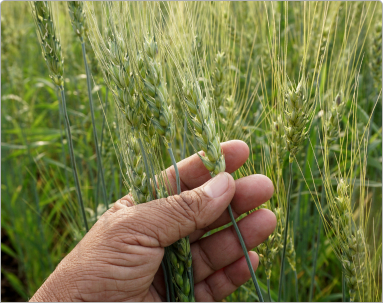

Crop
Kharif Season
Non-Basmati Paddy, Basmati paddy, Maize, Sesame
Rabi Season: Wheat, mustard, lentils etc.
Impact

Impact of Our Farmers
The impact of our farmers is significant in enhancing soil fertility through various methods such as crop rotation, cover cropping, reduced tillage, and application of compost. These practices reduce fuel-intensive tillage, resulting in carbon sequestration, decreasing greenhouse gases, and reversing climate change. In addition, they can improve soil structure and reduce the possibility of soil erosion.

Difference Our People Are Making
The difference our organization is making is by converting land from conventional management to organic management, managing the entire surrounding system for biodiversity and sustainability, and using alternative sources of nutrients such as crop rotation, residue management, and organic manures. We provide complete biological inputs to our crops, and our teams supervise and manage weed and pest control through better management practices, physical and cultural means.

Contribution by Our Customers
Our customers’ contribution is vital in promoting food safety and environmental issues. The concern for their health, the environment, and worldwide crises has increased exponentially. Organic agriculture has become the only option for many consumers. Simply by consuming organic produce, they are contributing to the overall health of the planet and making an impact towards sustainability.



